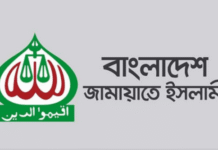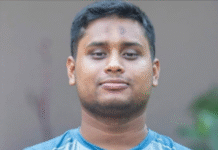
Prime Minister Sheikh Hasina on Tuesday strongly hit back at opposition leader Khaleda Zia for her disparaging remarks about Gopalganj, the home district of Father of the Nation Bangabandhu Sheikh Mujibur Rahman.
“Nobody can erase the name of Gopalganj from the world, rather those who will try to do that will vanish; this is the reality,” she said, addressing a workers conference on the premises of her in laws’ house, ‘Joy Sadan’, at Fatehpur here.
On December 29, opposition leader Khaleda Zia in a sudden outburst towards some police personnel who were on special security duty outside her Gulshan residence, saying “where are you from, Gopali? Gopalganj? The name Gopalganj will be changed… Gopalganj won’t exist”.
Talking about the offensive attitude of opposition leader Khaleda Zia about Gopalganj, the Awami League President said it seemed to her that the opposition leader is very angry with the particular district.
She said Gopalganj is the home district of the Father of the Nation and he is now lying at eternal rest on the sacred soil of the district. “It’s the home district of the person who presented the nation an independent country after a long struggle. That’s why she (Khaleda) does not like Gopalganj since she does not love independent Bangladesh.”
She further said that Bangabandhu is the person who made Major Zia a major general. “It’s Bangabandhu because of whom you (Khaleda) remained the wife of Zia.”
Questioning the reasons of the opposition leader’s outburst at Gopalganj, Hasina said: “She (Khaleda) is angry since she failed to kill her (Hasina) in the August 21 grenade attack. “How could she (Khaleda) prove she was not involved in the August 21 grenade attack that killed more than 23 AL activists including Ivy Rahman?”
Alleging that the opposition leader is angry at Gopalganj since her beloved Pakistan does no longer exist here, the Awami League chief said: “She (Khaleda) never wanted independent Bangladesh… she is now engaged with Jamaat for the movement, Jamaat is the center of her all power.”
“That Jamaat won’t be able to participate in the election now as per the High Court verdict is her sorrow. This is the reason the opposition leader is against holding the (January 5) election.”
Recalling her efforts to bring the opposition leader to the dialogue table, Hasina said: “Whenever I called her (Khaleda) for dialogue she came up with an ultimatum. In the future we all will see who will stay in Bangladesh and who will flee away from here.”
She alleged that all the agitation and movement of the opposition leader is just to save the war criminals, nothing else.
Talking about the BDR mutiny, the Prime Minister said that in the recent times, the international media have revealed who was involved in the conspiracy. “It is the ISI which was involved in the heinous killing of 57 army officers (in the mutiny).”
Recalling the incidents during the BDR mutiny, she said that the opposition leader on February 25 early morning “left her cantonment house to an unknown destination without taking along her government protocol.”
“She (Khaleda Zia) is not an early riser, but on that particular day she woke up from bed very early and went away from her house. She did not return to her cantonment house for more than one month. It means she knew about the killing of the army officers.”
Hasina mentioned that during the trial of the BDR mutiny the pro-BNP and Jamaat lawyers provided the legal assistance to the accused.
About BNP leader Shamsher Mobin Chowdhury, she said: “This is the person who took care of the killers of Bangabandhu after Zia sent them abroad.”
The Awami League chief alleged that the opposition leader, like her husband, loves to play with dead body and blood.
About the upcoming general election, she said the opposition leader “never opts for the path of discussion and dialogue, rather it is her nature to go for destructive activities.”
Referring to the AL election manifesto released a couple of days back, she said that in the manifesto it was stated that Bangladesh will be a developed country by 2041. “We know we can do that as we always work for the welfare of the country and its people.”
In her speech, Hasina also highlighted the development activities of the Awami League-led Grand Alliance government in the last five years.
President of Pirganj Upazila Awami League Motaharul Huq Bablu presided over the workers conference.
Source: UNB Connect










Hasina, what trash………
It was the 75m people of Bangladesh who rightly earned their independence with their blood – not Hasina’s father who spent that time in comfort in a Pakistani jail. Why did he surrender to the Pakistani Army?
So, It was not Sk.Mujib who presented the people of Bangladesh with an independent country, rather it was the people of Bangladesh who presented him with an independent country to loot and plunder.
Hasina can take her Gopalganj and vanish and let the 160m people live in peace.
It seems blood does not flow through the veins of Bangladesh people any more. One wonders are these the people who reacted to the Pakistani occupation army’s atrocities like Royal Bengal Tigers? Very doubtful. Begum Zia did not do good to react the way she did on being harassed but is our PM a washed ‘tulsipata’? Didn’t she call a personality who was three times PM of this country ‘chor’, ‘etimer taka mere khawa’, ‘chorer maa’ and so many obnoxious phrases which could best suit a slum-sweller? And now look, what a hubbub a section of our ‘chetana’-brokers has raised. The PM brags to have given back people their right of voting, empowering them and just look at the irony! She has abolished referendum clause through which people could express their mind and made three fourth of the constitution unchangeable for ever. Thus she has given back people their right of vote and empowered them by cutting their hands and feet. God knows how much caricature of democracy is in store for us.
While I fully appreciate how angry Khaleda must have been when she was subjected to nasty provocations that she received from Hasina’s thuggish police I do agree with Safi, that as three time PM (and indeed, in a free and fair election she’ is likely to be the 4th time PM of Bangladesh), she should not have reacted the way she did. Having said this I also could not check my chuckle at what our current dear leader PM Hasina, the queen of gutter said to condemn Khaleda for her o-called ‘disparaging’ comments about Gopalganj by claiming that place is the birthplace of her father Sk Mujibur Rahman who “presented” the nation, Bangladesh.
This claim is not only audacious but an outright insult on the nation of Bangladesh who unlike the “Father of the Nation” who spent cosy time in a Pakistan jail and smoked pipe with his favourite Erinmore tobacco, borne the brunt of a war for which they were never prepared for and gave their lives and fought their way to independence.
Besides, many ugly things happened during the last week and among these, most despicable one has been the beating of the protesting female lawyers by the Awami thugs in the supreme court premises. Interestingly, in her it-is-all-about-me-and-my-family-only state of mind our PM’s attention to this incomprehensible ugly incident could not be drawn – ‘Gopalganj’ did!
Sooner the nations rids itself of the curse of Hasina better it is for the nation. Sadly, and thanks to India, the nation may have to wait few more bloodied years before this happens.
SURRENDER AT MIDNIGHT: MUJIB’S DILAMMAS AND DEATH
Abid Bahar
The dark side of leadership is the human desire for personal gains, and glory but leaders who think they can fool people bound to face dilemmas in making great ethical choices. Mujib was a great leader of Bangladesh exemplified in his 6 point demands to Pakistan, he also showed his greatness in his 7th March speech especially uttering threats to the Pakistani rulers that “Aberarar Sangram, Muktier Sangram, Aberar Sangram Shadhenotar Sangram” which effectively led to a civil war in East Bengal. But Mujib was neither a rebel nor had the brilliance of a statesman, rather he emerged to prominence as a cadre politician, a rebel-rouser, and an agitator, a demagogue lacking the vision to resolve dilemmas at times of great decision making posed to him as a leader of his people. One of the great dilemmas he faced in 1971 was whether to declare the independence of Bangladesh by saying “I, Sheikh Mujibur Rahman the elected supreme leader of East Bengalis (Bangladesh), declare the independence of Bangladesh.” However, he had been scaring the Pakistanis many times saying “aberear Sangram…” Despite the threats by ASM Rabb and others, from the 7th March through March 24 he kept negotians for a confederate status with separate currency for East Bengal. When the hour of choice neared, decided not to get out of his residence and lead the rebellion as a rebel leader, rather despite repeated request from his followers, he surrenders to the invading Pakistan army.
Thus, Mujib resolved the dilemma in his self interest by surrendering at midnight 25/26, 1971. Mujib’s surrender brought him personal safety for himself and his family. After the arrest, Mujib was taken to Pakistan and kept in a Pakistani General’s mansion with his access to the General’s home library and Mujib’s family remained safe in Dhaka receiving 1,500 rupees monthly. Many scholars question whether Mujib made a deal with the Generals through the mediation of Bhutto who was still in Dhaka to serve his end not the people’s.
Why the Generals didn’t kill Mujib and his family?
Mujib was a trickster. Mujib’s surrender ensured his and his family’s safety, but couldn’s stop the genocide the Pakistanis committed on the people of Bangladesh. This surrender event is famously known as the “Surrender at Midnight.” had a wideranging effect in the subsequent Bangladesh politics. This paper identies the fall outs from the surrender of Sheikh Mujib in the following:
(1) From the 7th March’s hopping and buffing to declare independence, and on the other hand during private talks with the Generals, Mujib blaming the leftist elements as the trouble making, Pakistani army felt that they invade Bangladesh and destroy not Mujib but the leftishs and pro-liberation forces who were forcing Mujib to declare independence.
Indeed, in the negotiation tables, Mujib’s sincere admission that he has been trying to save Pakistan his saved his and his family’s life at the cost of a genocide caused by Mujib’s identification of the “real enemy” the aspirators of independence- thus murder of Dhaka University professors, and masses who were seen as the intellectuals demanding independence.
(2) Mujib’s failure for a clear UDI (Unilatteral Declaration of Independence) made many Bangladeshis remain committed to Pakistan that we call today, the razakars and others at the call of Ziaur Rahman, Bhasani and Syed Nazrul Islam joined the liberation war. Thus Mujis contributed in confusing people whether to support the liberation war or oppose it, the outcome was the division of Bangladeshis between Pakistani supporters-razakars and the supporters of the liberation war.
(3) While Mujib left Bangladesh and remained the entire liberation war time in Pakistan not knowing any developments taking place in Bangladesh, he practically remained in a bubble. Indeed, Bangladeshi Bengalis during the nine months of war time radicalized from a peaceful mostly rural folk into a people connected to global events. Mujib’s exile increased his ignorance about his people he was expected to deliver democracy and economic development.
(4) Mujib’s absence was felt throughout the war time. The leaders leading the war were from the grassroots but Mujib was the elected supreme leader. This was prominently felt as the Pakistani army was surrendering to India without the presence of any Bangladeshi military or civilian leader’s present.
(5) Mujib’s absence was also felt in Indian lack of respect to the Bangladesh’s liberation forces and Bangladesh’s sovregnity. Bangladesh was clearly undermined when Indian army were engaged in looting movable goods from Bangladesh to India. If Mujib was present during the war, it could have been possibly different.
Sadly, after Mujib’s return from Pakistan, due tohis absence, he embraced his cadres to help him show the way, many of these cadres like Golam Mostofa, Tofail, Mannan themselves were known to be in Calcutta engaged in non appreciative activities, misled him to control the already radicalized people through the use of force than to deliver their democractic wishes.
India also extended Mujib a hand by forming the notorious Rakkhi bahini for his firm control over Bangladesh.
In addition, the ignorant, and inefficient Mujib who on March 25 midnight betrayed with his people began to import ideas of socialism from Russia, the spirit of Bengali nationalism from West Bengal not Bangladeshi nationalism of the East Bengalis, secularism from Indra Congress, and democracy to make the West happy came up with a hozpoz of self contradictory ideas called by Mujib followers as “ Mujibbad” as if Mujib was a philosopher, and Mujib
imposing these ideas with a one party rule called BKSAL. Mujib’s followers also declared Mujib the absentee leader as the “father of Bangladesh.”
Mujib’s short rule implimented from December 10 ending in August 15, 1975 began to make people dissatisfied at the deliverance of Mujibbadi cadre politics, anarchy, and famine, instead of democratic and economic development Mujib demanded from the Pakistani rulers.
It seems that Mujib was driven by his personal ambition to become the Prime Minister of Pakistan in a Pakistani confederation. He wasn’t driven by the wishes of people demanding independence, thus he surrendered..
During Bangladesh period his gains, and glory remained prominent in his making choices. And when faced with dilemmas, he failed to make choices in favor of the people he led, he rather was driven to establish a Mujib dynasty by killing the infant democracy in Bangladesh. In the end, he was killed by some freedom fighters of Bangladesh liberation war led by his own deputy Khondakar Mostaque Ahamed for his surrender at midnight, and for turning Bangladesh into what is called a “bottomless basket case.”
(Dr. Abid Bahar is a playwright and public speaker, now teaches in Canada on Ethics of Leadership.”.)